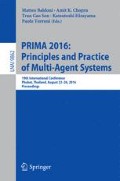Abstract
This paper deals with the question of how one should predict agent’s psychological opinions regarding acceptability statuses of arguments. We give a formalization of argumentation-based acceptability learning (ABAL) by introducing argument-based reasoning into supervised learning. A baseline classifier is defined based on an optimization method of graph-based semi-supervised learning with dissimilarity network where neighbor nodes represent arguments attacking each other, and therefore, the optimization method adjusts them to have different acceptability statuses. A detailed comparison between ABAL instantiated with a decision tree and naive Bayes, and the optimization method is made using each of 29 examinees’ psychological opinions regarding acceptability statuses of 22 arguments extracted from an online discussion forum. We demonstrate that ABAL with the leave-one-out cross-validation method shows better learning performance than the optimization method in most criteria under the restricted conditions that the number of training examples is small and a test set is used to select the best models of both methods.
Access this chapter
Tax calculation will be finalised at checkout
Purchases are for personal use only
References
Dung, P.M.: On the acceptability of arguments and its fundamental role in nonmonotonic reasoning, logic programming, and \(n\)-person games. Artif. Intell. 77, 321–357 (1995)
Cayrol, C., Lagasquie-Schiex, M.C.: On the acceptability of arguments in bipolar argumentation frameworks. In: Godo, L. (ed.) ECSQARU 2005. LNCS (LNAI), vol. 3571, pp. 378–389. Springer, Heidelberg (2005)
Amgoud, L.: Repairing preference-based argumentation frameworks. In: Proceedings of the 21st International Joint Conference on Artificial Intelligence, pp. 665–670 (2009)
Bench-Capon, T.J.M.: Value-based argumentation frameworks. In: Proceedings of the 9th International Workshop on Non-Monotonic Reasoning, pp. 443–454 (2002)
Modgil, S., Luck, M.: Argumentation based resolution of conflicts between desires and normative goals. In: Rahwan, I., Moraitis, P. (eds.) ArgMAS 2008. LNCS, vol. 5384, pp. 19–36. Springer, Heidelberg (2009)
Leite, J., Martins, J.: Social abstract argumentation. In: Proceedings of the 22nd international joint conference on Artificial Intelligence, pp. 2287–2292 (2011)
Verheij, B.: Two approaches to dialectical argumentation,: admissible sets and argumentation stages. In: Proceedings of the 8th Dutch Conference on Artificial Intelligence, pp. 357–368 (1996)
Caminada, M.: Semi-stable semantics. In: Proceedings of the 1st International Conference on Computational Models of Argument, pp. 121–130 (2006)
Dung, P.M., Mancarella, P., Toni, F.: A dialectic procedure for sceptical, assumption-based argumentation. In: Proceedings of the 1st International Conference on Computational Models of Argument, pp. 145–156 (2006)
Baroni, P., Giacomin, M., Guida, G.: SCC-recursiveness: a general schema for argumentation semantics. Artif. Intell. 168(1–2), 162–210 (2005)
Coste-Marquis,S., Devred, C., Marquis, P. : Prudent semantics for argumentation frameworks. In: Proceedings of the 17th International Conference on Tools with Artificial Intelligence, pp. 568–572 (2005)
Chapelle, O., Schölkopf, B., Zien, A.: Semi-Supervised Learning. The MIT Press, Cambridge (2010)
SYNCLON: Synclon\(^{3}_{\beta }\) (2013). http://synclon3.com/
Egly, U., Gaggl, S., Woltran, S.: Aspartix: implementing argumentation frameworks using answer-set programming. In: Proceedings of the Twenty-Fourth International Conference on Logic Programming, pp. 734–738 (2008)
Amgoud, L., Serrurier, M.: Agents that argue and explain classifications. Auton. Agents Multi-Agent Syst. 16(2), 187–209 (2008)
Možina, M., Žabkar, J., Bratko, I.: Argument based machine learning. Artif. Intell. 171(10–15), 922–937 (2007)
Gao, Y., Toni, F.: Argumentation-based reinforcement learning for robocup soccer takeaway (extended abstract). In: Proceedings of the 13th International Conference on Autonomous Agents and Multiagent Systems, pp. 1411–1422 (2014)
Goldberg, A.B.: Dissimilarity in graph-based semisupervised classification. In: Proceedings of the 11th International Conference on Artificial Intelligence and Statistics (2007)
Kido, H.: Learning argument acceptability from abstract argumentation frameworks. In: Proceedings of the 2nd International Workshop on Argument for Agreement and Assurance, pp. 40–53 (2015)
Acknowledgments
This work has been conducted as a part of “Research Initiative on Advanced Software Engineering in 2015” supported by Software Reliability Enhancement Center (SEC), Information Technology Promotion Agency Japan (IPA).
Author information
Authors and Affiliations
Corresponding author
Editor information
Editors and Affiliations
Rights and permissions
Copyright information
© 2016 Springer International Publishing Switzerland
About this paper
Cite this paper
Kido, H. (2016). Argumentation Versus Optimization for Supervised Acceptability Learning. In: Baldoni, M., Chopra, A., Son, T., Hirayama, K., Torroni, P. (eds) PRIMA 2016: Principles and Practice of Multi-Agent Systems. PRIMA 2016. Lecture Notes in Computer Science(), vol 9862. Springer, Cham. https://doi.org/10.1007/978-3-319-44832-9_23
Download citation
DOI: https://doi.org/10.1007/978-3-319-44832-9_23
Published:
Publisher Name: Springer, Cham
Print ISBN: 978-3-319-44831-2
Online ISBN: 978-3-319-44832-9
eBook Packages: Computer ScienceComputer Science (R0)

